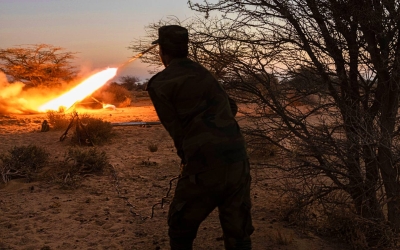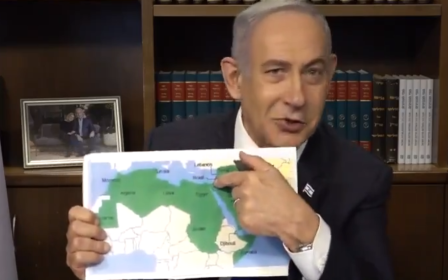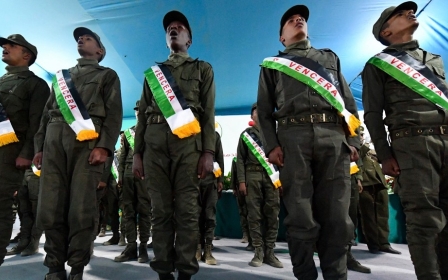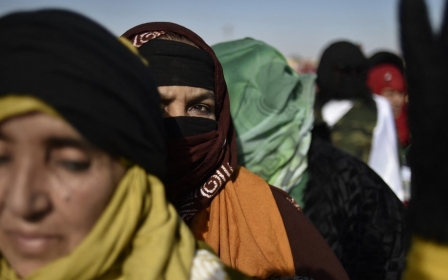Western Sahara: France backs Morocco's claim of sovereignty and its autonomy plan
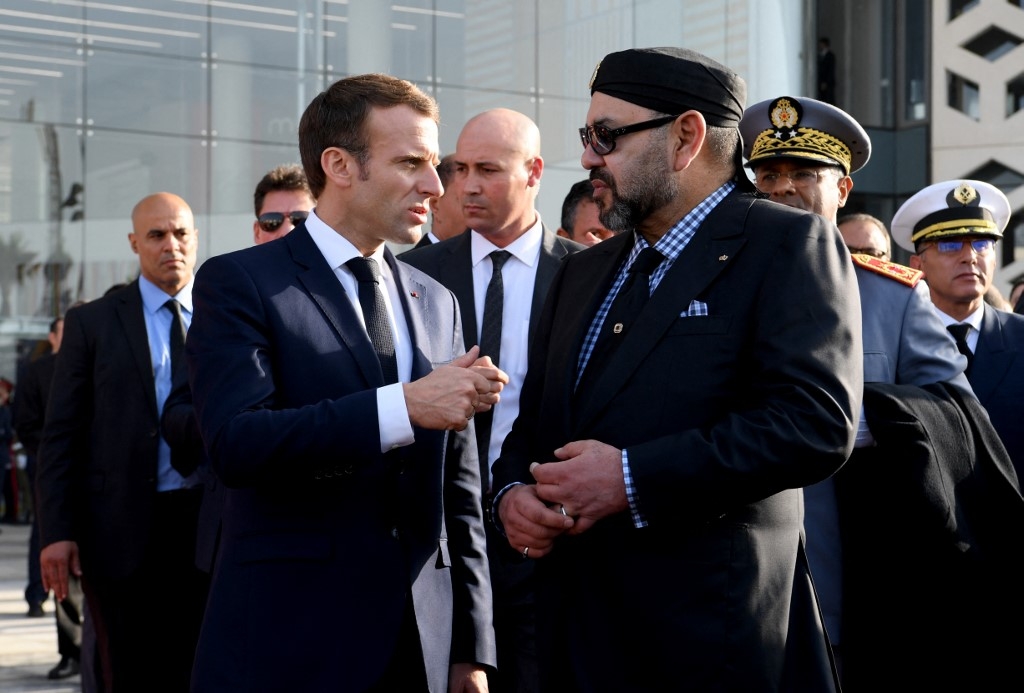
France has backed Morocco's claim of sovereignty over Western Sahara and its autonomy plan, which Rabat said President Emmanuel Macron described as "the only basis" for resolving the nearly 50-year conflict with Sahrawis seeking independence.
According to a statement released by Morocco's Royal Court on Tuesday, Macron sent a letter to King Mohammed VI to mark the anniversary he ascended to the throne.
In the letter, Macron reportedly told the king that Morocco's plan for Western Sahara, where the territory is recognised as Moroccan but given some degree of autonomy, "now constitutes the only basis for reaching a just, lasting and negotiated political solution in accordance with the resolutions of the United Nations Security Council".
"The present and future of Western Sahara are part of Moroccan sovereignty," the letter reportedly says.
Western Sahara, a former Spanish colony with rich fishing waters and significant phosphate reserves, is controlled for the most part by Morocco, but claimed by the Polisario Front, a Sahrawi independence movement that is supported by Algeria.
New MEE newsletter: Jerusalem Dispatch
Sign up to get the latest insights and analysis on Israel-Palestine, alongside Turkey Unpacked and other MEE newsletters
Polisario fought a 1975-91 war with Morocco, which ended with 80 percent of the territory in Moroccan hands and a ceasefire that promised a self-determination referendum under the auspices of the United Nations that has never materialised.
Hostilities broke out again in 2020, with the sides now trading artillery and drone strikes across the fortified sand wall, known as the berm, that Morocco built along the territory.
Meanwhile, Moroccan authorities continue to harshly crack down on Sahrawis in territory it controls that are supportive of independence.
'The present and future of Western Sahara are part of Moroccan sovereignty'
- Macron's letter to King Mohammed VI
The UN considers Western Sahara a "non-autonomous territory".
"For France, autonomy under Moroccan sovereignty is the framework in which this question must be resolved. Our support for the autonomy plan proposed by Morocco in 2007 is clear and constant", Macron wrote in his letter, a copy of which was obtained by AFP.
"Moreover, the pursuit of the economic and social development of this region is an imperative. I welcome all the efforts made by Morocco in this regard.
"France will support [Rabat] in this approach for the benefit of the local populations."
In response, the Royal Court described France's move as "an important and significant development in support of Moroccan sovereignty over the Sahara".
Morocco's ambassador to Paris, Samira Sitail, welcomed "clear support for Moroccan sovereignty".
Shifting positions
The recognition of “Moroccan sovereignty" over the disputed region marks a significant recalibration of France’s stance on the issue, which has been evolving in that direction in recent months.
Since 2007, France has “supported” the autonomy plan for this territory, but without expressly validating its “Moroccanness”, as requested by Rabat, in order to take into account previous UN resolutions on the matter.
But after a period of sour Morocco-France relations between 2021 and 2023, mainly on account of Macron's decision to reduce the number of visas for Maghreb countries at the time as well as his reconciliation attempts with Algiers, French diplomacy has been clearly angling for a rapprochement with Morocco.
During a visit to Rabat on 26 February, French Foreign Minister Stephane Sejourne made a considerable step towards the Moroccan stance by declaring that “France knows that the question of Western Sahara is existential for Morocco and for all Moroccans”.
Sejourne also voiced his support for Moroccan investments in Western Sahara, a strong, symbolic gesture.
After the trip, a French diplomatic source told Moroccan media Hespress that "the French position on the Sahara issue announced during Sejourne's visit constitutes a new turning point, since he addressed for the first time the issue of Paris' support for Moroccan investments in the southern provinces," using the name given by Rabat to the disputed territory.
The same source explained that "the French position on the Sahara issue will in reality evolve over time, in stages, and this change cannot be sudden or rapid."
Algeria withdraws its ambassador
This latest development is likely to create another crisis between France and Algeria. Algiers cut its diplomatic relations with Rabat in 2021, in large part over the Sahrawi issue.
On Tuesday, the Algerian government announced the "withdrawal with immediate effect" of its ambassador to France.
"The Algerian diplomatic representation in France is now the responsibility of a charge d'affaires," the Ministry of Foreign Affairs added in a statement published by the official APS agency, denouncing a "step that no other French government had taken before it."
By recognising the Moroccan autonomy plan as the "sole basis for settlement" of the Western Sahara conflict, France "flouts international legality, takes up the cause of the denial of the right of the Sahrawi people to self-determination, and distances itself from all the patient and persevering efforts deployed by the United Nations" to "complete the decolonisation of Western Sahara", Algiers added.
"The French government has ended up giving its frank and categorical support for the colonial fact imposed on Western Sahara," the Algerian government said, adding that France made its decision "with great casualness and great nonchalance, without lucidly measuring all the potential repercussions".
Algeria, which hosts the Polisario Front and 176,000 Sahrawi refugees in camps, appears to have known the announcement was coming, and on Thursday expressed its "disapproval" of an "unexpected decision" by Paris on Western Sahara.
Saying that it had been informed a few days earlier of the imminent change in policy, Algiers criticised the "inopportune and counterproductive decision" which "does not help to bring together the conditions for a peaceful settlement" of the issue.
Algeria warned it would "draw all the consequences that flow from this French decision" and for which the French government "assumes alone full and entire responsibility".
A state visit by Algerian President Abdelmadjid Tebboune to Paris, scheduled for the end of September after being postponed several times, could be called into question, according to the Algerian news site TSA, which anticipates a "new diplomatic spat" with France.
Mohamed Sidati, the foreign minister of the Sahrawi Arab Democratic Republic, a partially recognised state proclaimed by the Polisario in 1976, criticised on Tuesday the French change of direction, warning of its consequences for the region.
"The French government is no longer hiding it: by officially declaring these days that it supports 'the Moroccan autonomy plan', it is the violent and illegal occupation of Western Sahara that France is supporting," he said.
"We are a hair's breadth away from large-scale destabilisation of the region," Sidati added.
France is the second UN Security Council member to recognise Moroccan sovereignty in Western Sahara after the United States.
In 2020, the Trump administration announced it recognised the territory as part of Morocco, a move it made in return for Rabat normalising relations with Israel.
Two years ago, former colonial power Spain also upended its Western Sahara policy and declared Morocco's autonomy plan "the most serious, realistic and credible basis for the resolution of the dispute".
Middle East Eye delivers independent and unrivalled coverage and analysis of the Middle East, North Africa and beyond. To learn more about republishing this content and the associated fees, please fill out this form. More about MEE can be found here.


